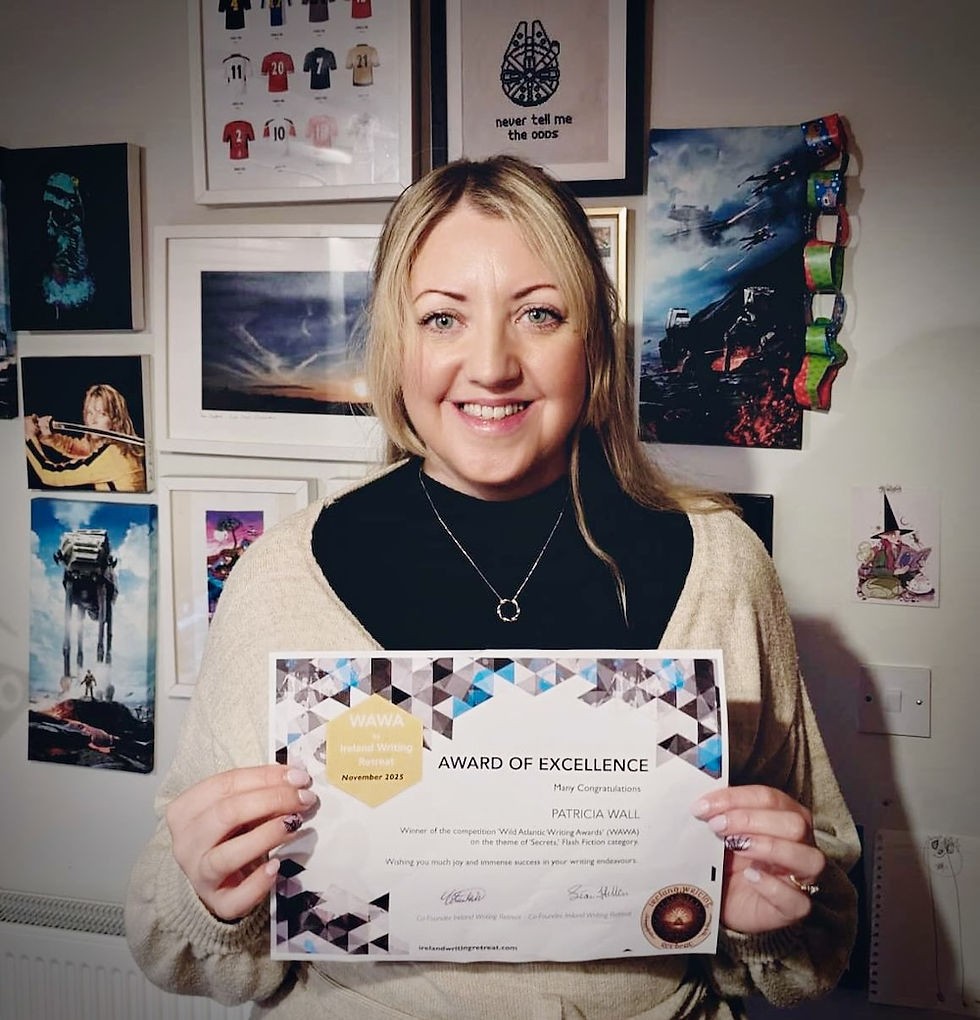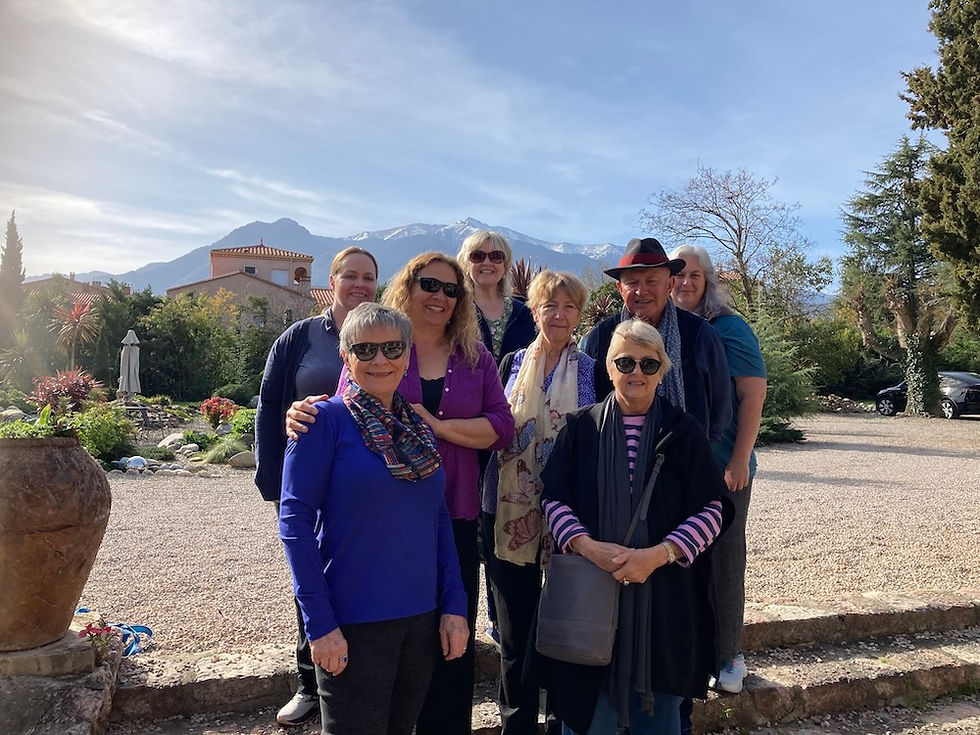Writers In Canada And Switzerland Win WAWA Competition
- columbiahillen

- Oct 6, 2024
- 7 min read
Illustrating the sheer diversity of people entering our Wild Atlantic Writing Awards (WAWA), we proudly introduce Shelley Arnfield, a retired police officer living on Vancouver Island, and Nicole Scobie, a former air traffic controller in Geneva, winners of our latest competition.

Writing on the theme of ‘danger,’ Shelley won the creative non-fiction category with her excellent story ‘New Kid,’ about a dangerous police encounter with an armed gunman, and Nicole in the flash fiction category with her gripping story ‘The Locker,’ about a bold and enterprising 87-year-old woman who outsmarts a corrupt nursing home director.
In both stories, judges said, Shelley and Nicole managed to vividly convey both a sense of danger while introducing “delicious elements of black humor.”
Shelley Arnfield
“Who wouldn’t be thrilled to receive an email announcing, ‘You are a winner?’ At least my 66 year old heart didn’t stop.”

Those were the words Shelley used to describe her elation at being named winner of WAWA, adding, “Because writing is so subjective, I feel so very blessed and fortunate. What wins in one contest may not even get a blink in another. The validation is invaluable.”
A retired police officer from Toronto, now living in Port Alberni on Vancouver Island off the west coast of British Columbia, Canada, Shelley has spent most of her career in policing and security, though she added jokingly, “Except for a stint performing weddings. At least people were happy to see me then.”
Seeing details about WAWA on Facebook, she was impressed with the enticing reward. “I have to admit, the prize motivated me to enter, especially as I am hoping to attend an upcoming Ireland Writing Retreat. Compared to other contests, this prize is definitely considerable.”
Shelley says she does most of her ‘writing’ while walking her dog. “The challenge is then to get those words down on paper to sound as good as they did in my head. Then it’s left to percolate for days or sometimes weeks before a final touch up.”
On story composition, she said, “I find the structure of a flash story can be as important as the words and tried to convey the slow progression of the event with short, choppy sentences, before the gush of words at the end when the adrenalin finally peaked.”
Shelley particularly enjoys writing to a word count. “I love the economy of making every word work. Flash pieces undergo many revisions for that reason.”
She admitted that working in police and security for so many years helped her greatly in the competition. “Given my background I certainly felt I had enough fodder for a story on the concept of danger.”
Choosing her story title was a major challenge, “The title for this one was the hardest part. Sometimes a story just screams the title. This one didn’t and it took days to come up with one. Still not happy with it.”
New Kid
by Shelley Arnfield

I’m going to die.
That’s not some random ‘we’re all going to die someday’ kind of thought.
I’m talking the here and now.
I Am Going To Die.
The guy is a black silhouette, backlit by the only street light in this crappy little out in the boonies trailer park.
He’s holding a rifle across his chest.
And he’s walking straight towards me.
I have a .38 Smith and Wesson revolver. Definitely outgunned.
How did I get here?
Some important facts to know — this is a domestic dispute gone horribly wrong. I was charged with barricading the road with my police car. Far from the scene.
Boring. Until it wasn’t.
Oh, and I’m not even a rookie yet. I’m still in training.
We’ve been given permission to use deadly force. I need permission? Nobody else has resorted to that yet, despite being challenged by our friend with the rifle.
He’s still walking towards me.
But now I have back up. Or maybe in this case I’m the back up.
A guy outranking me has ordered me to move the car.
I don’t ask. Just crawl in from the passenger side and start it.
Except now the guy outranking me is standing beside the driver’s side of the car. I might be new but even I can figure it out — if I move the car, he has no cover.
Zero.
This guy’s nickname is Clueless. Not to his face. Now I know why.
I bail out of the car. Hope to hell Clueless doesn’t get in and drive it away. Why did he want it moved anyway?
I take cover behind the rear tire. Gun drawn.
Our friend is right beside the car now. Pointing his rifle at Clueless who is now on my side of the car.
Clueless fires. More than once.
I don’t count the shots.
He misses. Every shot.
And now the car is moving. The keys were in the ignition. My fault? Not really. We were short of portable radios on our shift. I needed the keys in the ignition to use the car radio.
Should I have taken them when I bailed? Maybe.
But I was in a bit of a rush.
Clueless is shooting at the moving car. At the tires. He misses.
That only ever works on TV.
Now everyone else are jumping into their cars and giving chase.
I’m ordered to stay and guard the scene.
I wonder what will happen if he returns. I have no radio. I have no way to let anyone know.
Anything.
I don’t know when I re-holstered my weapon. I don’t know how long it took before the big boys in their unmarked car showed up. I don’t know how they got me to stop talking long enough to take a breath when they asked me what happened.
The one thing I do know is I’m not going to die.
Not this day anyway.
Nicole Scobie
A Canadian living in a small town near Geneva, Nicole learned about her WAWA success from friends. “I was absolutely shocked. I received messages from friends before I even saw the email. And once I got over the shock, I was thrilled.”

Nicole wrote her story deep in the mountains of Switzerland. “I was at a writing retreat with some friends from the Geneva Writers Group in a small village near the entrance of the mountain valleys. We each talked about our projects before squirrelling ourselves away all day alone in our small rooms to write. The view out the window was amazing, and I spent the time coming up with my story.”
She added, “The theme was really fun and I'm looking forward to the next one. I’ve been reading about the retreats in Ireland and France and trying to decide if/when I can go. They look amazing.”
Painstaking revision was key to completing her story. “At least three full ones, meaning total rewrites, including changing the plot and characters. Then I probably re-read my draft and made some edits a dozen times.”
She added, “I wanted the main character to be someone devious but pretending to be innocent, someone who hides her intelligence and lets other people take her for granted and make assumptions, because she wants to go unnoticed. It was hard to fit all that in the word limit and still have room for a plot.”
As for her title, “I’m still not sure if it is my favourite but I was almost out of time and had to make a decision.”
The Locker
by Nicole Scobie

I went missing four hours and twenty-three minutes ago.
The exact time is recorded because I’d phoned 911. My call ended with an abrupt smash – just enough time to say my name.
Our retirement community’s director, Mr. Bunce (Dunce, I call him) told police I’m a flaky old woman. Senile, delusional. Probably wandered off and got lost again.
Finding me won't be easy. Gym classes are infrequent, and most lockers unused. We prefer knitting, scrabble, and gossip as active lifestyle choices.
My indignation builds as I wait, stuffed in my dark cramped prison. The metal door is locked. Nobody will hear if I yell. I'm dizzy, my legs cramping.
I have to survive. I might be eighty-seven, but I’m not done yet. If I die, Director Dunce will get away with it all. Falsifying Alzheimer diagnoses to control residents’ assets. Years of corruption.
Everyone is blind to his scam. Except me; flaky, delusional Betty.
I figured it out.
I had snuck into his office during a scrabble intermission (naptime generally,) snooping.
But he caught me (darn hearing aid batteries!) and grabbed the files.
“No one will believe you, Elizabeth.” He smiled with contempt, coming closer.
I hurled my lucky scrabble piece, perfectly hitting his eye. I ran, (let’s say, shuffled fast.) My mind raced.
I hid, dialling 911. I could hear him coming.
Now in this cramped locker, I wait. And hope.
Finally, noise. Music from the weekly “Fun-Fitness” class everyone hates. It's my chance. I kick the metal door, yelling.
This has to work. He can’t win.
I feel like I can’t breathe. The walls are getting tighter.
There’s a sudden light. My heart jumps. Hopefully my pacemaker is keeping up. I peer through the vents and see the gym instructor, followed by some residents, all sweaty. I whimper.
It takes them a while to react. They babble at each other. I mumble, “hurry” pathetically. I can only see flashes of people through the narrow openings, but I’m enjoying their shocked looks as they fumble with keys. It’s exciting. When people panic, they act stupid.
I wait. I could actually help them, since I have a key in my pocket. I could easily slip it into the lock on this side and pop the door open. But of course, I don’t.
I whimper for dramatic effect.
Finally, it’s open. I collapse into their arms. They gasp, their mouths flapping like fish.
Later the police recover my slightly damaged phone in the locker. (Darn things are hard to break.) I’m hospitalized but will apparently make a full recovery. My picture is on the news! Director Dunce is charged, an investigation launched. The truth comes out.
The day of the trial, as he's led away, I watch him pass like I had from my hiding spot in the locker. I hadn’t panicked. That would be stupid. I’d planned my next move.
Now I smile with contempt as our eyes meet, like he had before my scrabble piece totalled him.
I win.










Comments